
Abu Faraj al-Libi is an assumed name or nom de guerre of a Libyan alleged to be a senior member of the al-Qaeda terrorist organization. His real name is Mustafa Faraj Muhammad Muhammad Masud al-Jadid al-Uzaybi. He was arrested by Pakistan's Inter-Services Intelligence (ISI) on May 2, 2005, in Mardan. Finding al-Libi was a joint effort of the Central Intelligence Agency's (CIA) Special Activities Division and Pakistan's Special Forces.
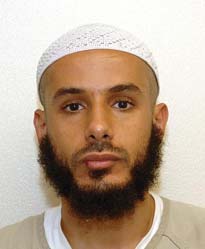
Fouzi Khalid Abdullah Al Odah is a Kuwaiti citizen formerly held in the United States Guantanamo Bay detainment camps, in Cuba. He had been detained without charge in Guantanamo Bay since 2002. He was a plaintiff in the ongoing case, Al Odah v. United States, which challenged his detention, along with that of fellow detainees. The case was widely acknowledged to be one of the most significant to be heard by the Supreme Court in the current term. The US Department of Defense reports that he was born in 1977, in Kuwait City, Kuwait.
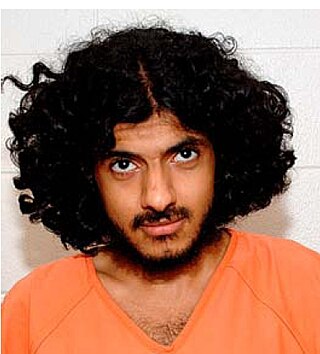
Hassan Muhammad Salih bin Attash is a citizen of Saudi Arabia, held by the United States in the Guantanamo Bay detention camp in Cuba. Joint Task Force Guantanamo counter-terrorism analysts estimate that bin Attash was born in 1985, in Jeddah, Saudi Arabia.

Abdul Zahir is a citizen of Afghanistan, who was held in extrajudicial detention in the United States' Guantanamo Bay detention camps, in Cuba. He was the tenth captive, and the first Afghan, to face charges before the first Presidentially authorized Guantanamo military commissions. After the Supreme Court ruled that the President lacked the constitutional authority to set up military commissions, the United States Congress passed the Military Commissions Act of 2006. He was not charged under that system.
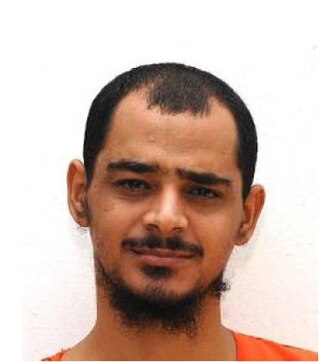
Adnan Farhan Abdul Latif, also known as Allal Ab Aljallil Abd al Rahman, was a Yemeni citizen imprisoned at the U.S. military prison at Guantanamo Bay, Cuba, from January 2002 until his death in custody there, ruled a suicide.

Faiz Mohammed Ahmed Al Kandari is a Kuwaiti citizen who was held in extrajudicial detention in the United States' Guantanamo Bay detainment camp in Cuba, from 2002 to 2016. He has never been charged with war crimes.

Saifullah Abdullah Paracha is a citizen of Pakistan who was held, without any charge, in the United States Guantanamo Bay detainment camps, in Cuba for over 18 years. He was released on October 29, 2022. As of 18 May 2021, Saifullah Paracha was approved for release by American authorities after his son Uzair Paracha's conviction was overturned in 2018 and the younger Paracha was repatriated to Pakistan in March 2020.

Abdul Haq Wasiq is the Director of Intelligence of the Islamic Emirate of Afghanistan since September 7, 2021. He was previously the Deputy Minister of Intelligence in the former Taliban government (1996–2001). He was held in extrajudicial detention in the Guantanamo Bay detainment camps, in Cuba, from 2002 to 2014. His Guantanamo Internment Serial Number was 4. American intelligence analysts estimate that he was born in 1971 in Ghazni Province, Afghanistan.
Mohammed el Gharani is a citizen of Chad and native of Saudi Arabia born in 1986, in Medina. He was one of the juveniles held for seven years at the Guantanamo Bay detention camp where they estimated his age to be 15–16, though Al Jazeera reports his age to have been 14 at the time of his arrest. Human Rights lawyer Clive Stafford Smith identified el Gharani as one of a dozen teenage boys held in the adult portion of the prison.

Ghaleb Nassar Al Bihani is a citizen of Yemen formerly held in the United States Guantanamo Bay detainment camps, in Cuba. The Department of Defense estimate that he was born in 1979, in Tabuk, Saudi Arabia.
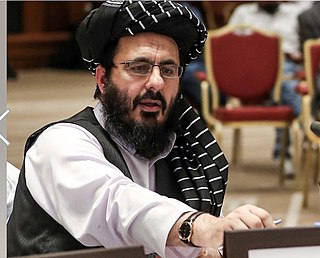
Mawlawi Mohammad Nabi Omari is an Afghan politician serving as First Deputy Minister for Interior Affairs under the internationally unrecognized Taliban regime since 6 October 2022. He was also appointed Acting Governor of Khost Province in late August 2021. Omari was held for nearly twelve years in extrajudicial detention at the United States Guantanamo Bay detainment camps, in Cuba. His Guantanamo Internment Serial Number was 832. American intelligence analysts estimate that he was born in 1968, in Khost, Afghanistan. He arrived at the Guantanamo detention camps on October 28, 2002.
Abd al-Salam al-Hilah is a citizen of Yemen, held in extrajudicial detention in the United States Guantanamo Bay detainment camps, in Cuba.

Moath Hamza Ahmed al-Alwi is a citizen of Yemen, held in extrajudicial detention in the United States Guantanamo Bay detainment camps, in Cuba. His detainee ID number is 28. Guantanamo analysts estimated he was born in 1977, in Al Hudaydah, Yemen.

Ayoub Murshid Ali Saleh is a citizen of Yemen who was held in extrajudicial detention in the United States Guantanamo Bay detainment camps, in Cuba. His Guantanamo Internment Serial Number is 836. The Department of Defense reports that he was born on April 29, 1978, in Usabee, Yemen.

Sharqawi Abdu Ali al-Hajj, also known as Riyadh the Facilitator, is a Yemeni alleged Al-Qaeda associate who is currently being held in the United States' Guantanamo Bay detention camps, in Cuba. He is accused of being a 'senior al-Qaida facilitator who swore an oath of allegiance to and personally recruited bodyguards for Osama Bin Laden.
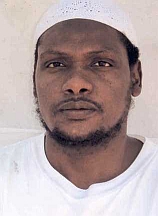
Mohammed Abdul Malik Bajabu is a citizen of Kenya currently held in administrative detention in the United States' Guantanamo Bay detention camps, in Cuba. He was born in Busia, Uganda, but has Kenyan citizenship. Abdul Malik was captured in February 2007, on suspicion of leading a terrorist bomb-plot in Mombasa. He was transferred to Guantanamo on 26 March 2007. Abdul Malik is a confirmed member of the East Africa al-Qaeda network as well as a confirmed member of the Council of Islamic Courts and the Islamic Part of Kenya. He "actively participated" in the facilitation of weapons and the planning of terrorist acts against the U.S., according to the Joint Task Force (JTF) at Guantanamo Bay. He was recommended for continued detention under the Department of Defense's control. The JTF gave Abdul Malik a high risk threat against the United States' interests and allies. He has no reports of disciplinary infractions as of May 22, 2007, granting him a low detention risk value. Abdul Malik does, however, have a high intelligence value.
Inayatullah, born Hajji Nassim (1974–2011) was a citizen of Afghanistan who was arrested in 2007 and transferred that year to be held as an enemy combatant in the United States Guantanamo Bay detainment camps, in Cuba. His Guantanamo Internment Serial Number was 10028. Nassim was held in Guantanamo for 3 years, 8 months, and 22 days until his death in an apparent suicide. The US claims he admitted being an al Qaeda leader, but Nassim denied this in numerous interrogation sessions. The US military claims he was headquartered in Zahedan, Iran. Nassim was the 19th captive to have been transferred to Guantanamo since September 6, 2006.

Muhammed Murdi Issa Al Zahrani is a citizen of Saudi Arabia who was held in the United States's Guantanamo Bay detention camps, in Cuba from August 5, 2002, until November 22, 2014. His Guantanamo Internment Serial Number was 713. Joint Task Force Guantanamo counter-terrorism analysts estimate he was born in 1969, in Taif, Saudi Arabia.
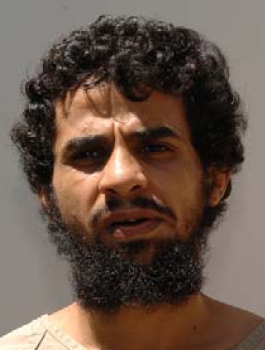
Mohammad Al Rahman Al Shumrani is a citizen of Saudi Arabia who was held in the United States Guantanamo Bay Naval Base, in Cuba. His Guantanamo Internment Serial Number was 195.
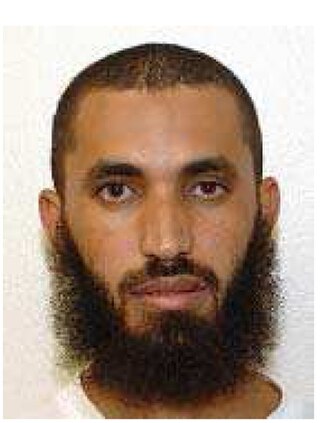
Abdel Malik Ahmed Abdel Wahab Al Rahabi is a citizen of Yemen who was held in extrajudicial detention by the United States from December 2001 to June 22, 2016. He was one of the first twenty captives transferred to the Guantanamo Bay detention camps, in Cuba, on January 11, 2002, and was held there until he was transferred to Montenegro, which granted him political asylum.

















